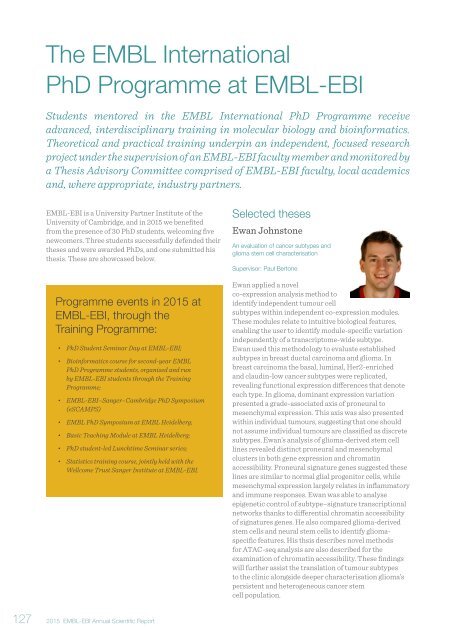Annual Scientific Report 2015
EMBL_EBI_ASR_2015_DigitalEdition
EMBL_EBI_ASR_2015_DigitalEdition
Create successful ePaper yourself
Turn your PDF publications into a flip-book with our unique Google optimized e-Paper software.
The EMBL International<br />
PhD Programme at EMBL-EBI<br />
Students mentored in the EMBL International PhD Programme receive<br />
advanced, interdisciplinary training in molecular biology and bioinformatics.<br />
Theoretical and practical training underpin an independent, focused research<br />
project under the supervision of an EMBL-EBI faculty member and monitored by<br />
a Thesis Advisory Committee comprised of EMBL-EBI faculty, local academics<br />
and, where appropriate, industry partners.<br />
EMBL-EBI is a University Partner Institute of the<br />
University of Cambridge, and in <strong>2015</strong> we benefited<br />
from the presence of 30 PhD students, welcoming five<br />
newcomers. Three students successfully defended their<br />
theses and were awarded PhDs, and one submitted his<br />
thesis. These are showcased below.<br />
Programme events in <strong>2015</strong> at<br />
EMBL-EBI, through the<br />
Training Programme:<br />
• PhD Student Seminar Day at EMBL-EBI;<br />
• Bioinformatics course for second-year EMBL<br />
PhD Programme students, organised and run<br />
by EMBL-EBI students through the Training<br />
Programme;<br />
• EMBL-EBI–Sanger–Cambridge PhD Symposium<br />
(eSCAMPS)<br />
• EMBL PhD Symposium at EMBL Heidelberg;<br />
• Basic Teaching Module at EMBL Heidelberg;<br />
• PhD student-led Lunchtime Seminar series;<br />
• Statistics training course, jointly held with the<br />
Wellcome Trust Sanger Institute at EMBL-EBI.<br />
Selected theses<br />
Ewan Johnstone<br />
An evaluation of cancer subtypes and<br />
glioma stem cell characterisation<br />
Supervisor: Paul Bertone<br />
Ewan applied a novel<br />
co-expression analysis method to<br />
identify independent tumour cell<br />
subtypes within independent co-expression modules.<br />
These modules relate to intuitive biological features,<br />
enabling the user to identify module-specific variation<br />
independently of a transcriptome-wide subtype.<br />
Ewan used this methodology to evaluate established<br />
subtypes in breast ductal carcinoma and glioma. In<br />
breast carcinoma the basal, luminal, Her2-enriched<br />
and claudin-low cancer subtypes were replicated,<br />
revealing functional expression differences that denote<br />
each type. In glioma, dominant expression variation<br />
presented a grade-associated axis of proneural to<br />
mesenchymal expression. This axis was also presented<br />
within individual tumours, suggesting that one should<br />
not assume individual tumours are classified as discrete<br />
subtypes. Ewan’s analysis of glioma-derived stem cell<br />
lines revealed distinct proneural and mesenchymal<br />
clusters in both gene expression and chromatin<br />
accessibility. Proneural signature genes suggested these<br />
lines are similar to normal glial progenitor cells, while<br />
mesenchymal expression largely relates in inflammatory<br />
and immune responses. Ewan was able to analyse<br />
epigenetic control of subtype–signature transcriptional<br />
networks thanks to differential chromatin accessibility<br />
of signatures genes. He also compared glioma-derived<br />
stem cells and neural stem cells to identify gliomaspecific<br />
features. His thsis describes novel methods<br />
for ATAC-seq analysis are also described for the<br />
examination of chromatin accessibility. These findings<br />
will further assist the translation of tumour subtypes<br />
to the clinic alongside deeper characterisation glioma’s<br />
persistent and heterogeneous cancer stem<br />
cell population.<br />
127<br />
<strong>2015</strong> EMBL-EBI <strong>Annual</strong> <strong>Scientific</strong> <strong>Report</strong>


